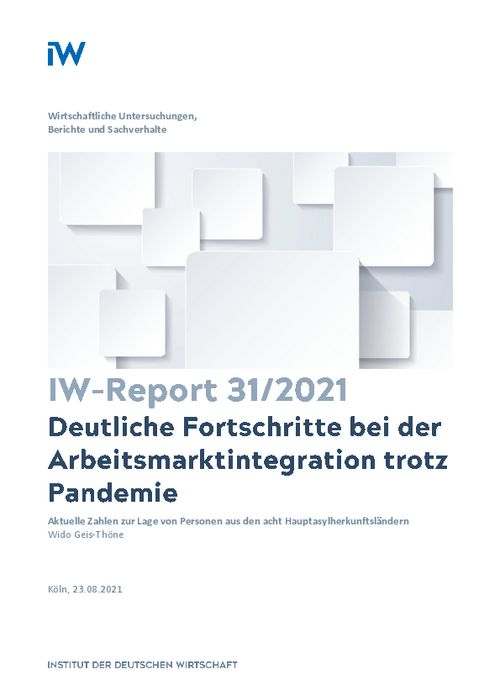The first lockdown in spring 2020 had a negative impact on the labor market integration of refugees in Germany.

Significant progress in labor market integration despite pandemic

The first lockdown in spring 2020 had a negative impact on the labor market integration of refugees in Germany.
The first lockdown in spring 2020 had a negative impact on the labour market integration of refugees in Germany. Between March 2020 and May 2020, the number of employees subject to social insurance contributions from the eight main countries of origin of asylum seekers, Afghanistan, Eritrea, Iraq, Iran, Nigeria, Pakistan, Somalia and Syria, fell by 12,000 or 3.4 percent. Semi- and unskilled workers in the helper sector were particularly affected. However, the situation eased significantly again in the following months and did not deteriorate seriously again during the second lockdown. In March 2021, the number of employed persons was 36,000 or 9.8 percent higher than a year earlier. At the same time, the share of employable beneficiaries receiving Arbeitslosengeld II in the population from the eight main countries of origin of asylum seekers also fell from 52.5 percent to 50.2 percent between February 2020 and February 2021.
This was not to be expected, as a large proportion of the employees subject to social security contributions from these countries were and are employed in the temporary employment and hospitality sectors, which were particularly affected by the pandemic. However, the employment losses here were more than offset by increases in other sectors such as transport and warehousing, health care and social services, and trade. The picture is markedly different for the number of unemployed people from the eight main countries of origin of asylum seekers, which was 20.3 percent or 45,000 higher in March 2021 than a year earlier. This can be explained primarily by the fact that many qualification measures were interrupted during the pandemic. If non-employed recipients of Arbeitslosengeld II take part in these, they are not counted as unemployed. Even if the situation on the labour market itself has not deteriorated, this is very unfavourable for the further course of integration, as qualifications that are important for the access to the labour market are not acquired. At the same time, the share of persons aged 15 to 64 from the eight main countries of origin of asylum seekers in employment subject to social insurance contributions was still very low at 31.8 percent in March 2021, compared to 46.6 percent for all foreigners and 63.1 percent for nationals. Against this backdrop, further integration policy action is necessary to successfully integrate refugees into the German labour market in the long run.

Significant progress in labor market integration despite pandemic

More on the topic

Securing skilled workers through immigration to universities
Against the backdrop of demographic change, Germany is increasingly dependent on skilled labour from abroad to secure growth and prosperity.
IW
Record immigration not only due to flight from Ukraine
In 2022, more people immigrated to Germany than ever before in the history of the Federal Republic. Around 1.46 million more people moved here than left the country, which is more than a quarter more than the previous record of 1.14 million from 2015.
IW